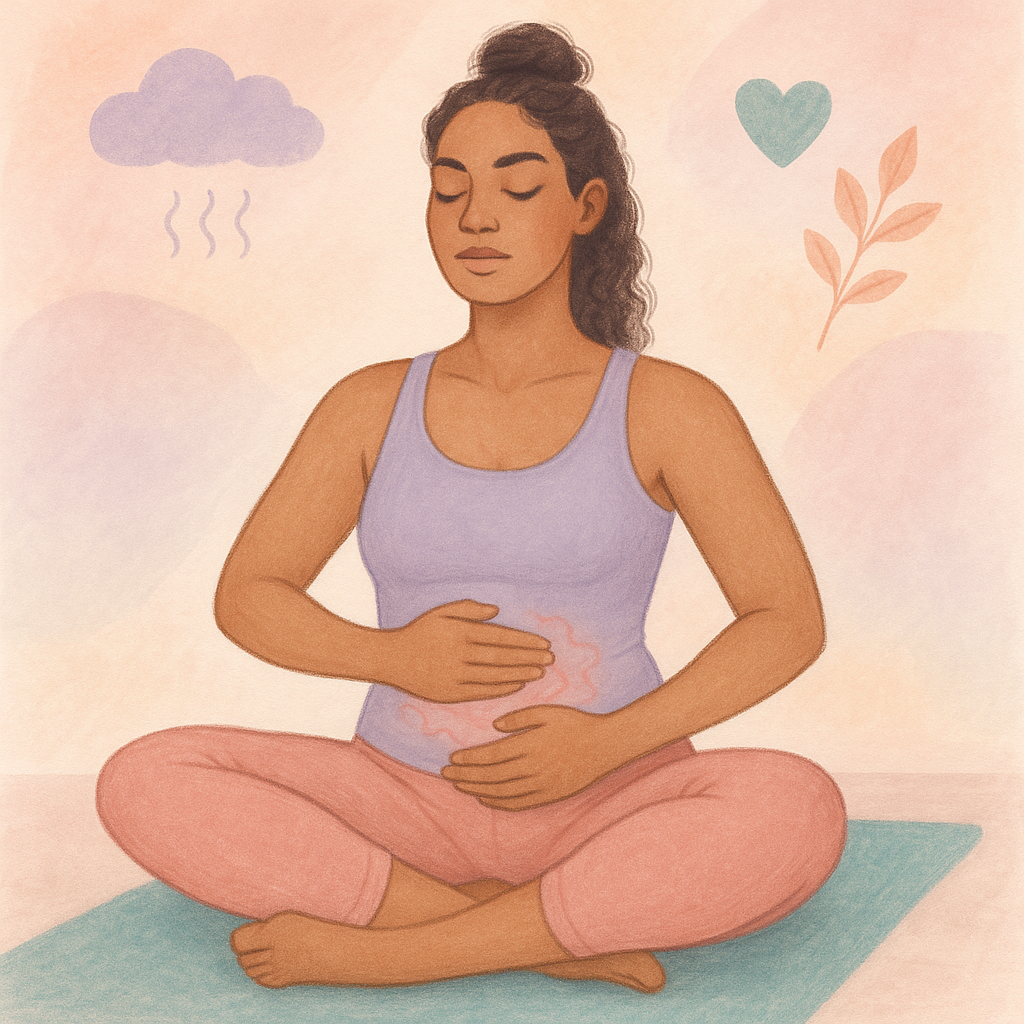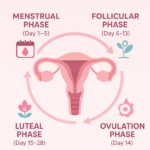Periods are a natural biological process that every menstruating person experiences, but the discomfort and changes that come along with it can feel overwhelming. Understanding period symptoms, why they happen, and how to manage them effectively can empower you to take control of your health and well-being.
This article covers in-depth explanations of the most common period symptoms, their causes, and scientifically-backed strategies to alleviate them using diet, exercise, self-care, and medical advice.
Let’s explore this important topic together! ✅
✅ What Are Period Symptoms?
Period symptoms are the physical and emotional signs that occur before or during menstruation. They range from mild discomforts to more intense issues that interfere with daily life. These symptoms are triggered by hormonal fluctuations, particularly in estrogen and progesterone, which influence almost every system in your body.
Everyone’s experience is unique. Some may only feel a little discomfort, while others face severe pain, mood disturbances, and fatigue.
📋 Table: Common Period Symptoms Explained
| Period Symptom | What It Feels Like | Why It Happens | How to Manage It |
|---|---|---|---|
| 🤕 Cramps | Sharp or dull pain in the lower abdomen or back | Uterus contracts to shed its lining | Apply heat, practice yoga, over-the-counter pain relief |
| 💧 Bloating | Swollen, tight abdomen, discomfort | Hormones cause water retention | Reduce salt, increase water intake, eat fiber-rich foods |
| 💓 Breast Tenderness | Sore, swollen, or sensitive breasts | Hormonal effects on breast tissue | Supportive bras, gentle massage, avoid caffeine |
| 😟 Mood Swings | Irritability, sadness, anxiety, anger | Estrogen and serotonin changes | Meditation, counseling, regular exercise |
| 💤 Fatigue | Extreme tiredness, low energy | Blood loss and hormonal shifts | Sleep well, eat iron-rich foods, hydration |
| 🤕 Headaches | Throbbing or sharp pain, migraines | Estrogen fluctuations, stress | Rest, hydration, prescribed or OTC medication |
| 🌿 Acne | Breakouts or oily skin | Hormones stimulate oil glands | Skin care, hydration, avoid greasy products |
| 🌱 Digestive Issues | Constipation, diarrhea, nausea | Hormones affect gut movement | Fiber, probiotics, gentle exercise |
🌟 Why Do These Period Symptoms Occur?
Understanding the science behind period symptoms helps you respond more effectively.
Hormonal Imbalance
The menstrual cycle is regulated by estrogen and progesterone. Their levels rise and fall throughout the month, influencing mood, energy, and physical functions.
- Estrogen affects serotonin, the “happy hormone,” which explains mood changes.
- Progesterone relaxes muscles, but its drop triggers contractions leading to cramps.
- These hormones also impact fluid retention, skin health, and digestive movement.
Lifestyle Factors That Influence Symptoms
✔ Diet – Lack of nutrients weakens your body’s ability to cope with hormonal shifts.
✔ Sleep – Poor rest disrupts your hormonal rhythm.
✔ Stress – Activates cortisol, which worsens cramps and mood swings.
✔ Lack of Exercise – Reduces circulation and increases discomfort.
✔ Medical Conditions – Polycystic Ovary Syndrome (PCOS), endometriosis, or thyroid issues can intensify symptoms.
📖 In-Depth Look at Common Period Symptoms
1️⃣ 🤕 Cramps (Dysmenorrhea)
Cramps are caused by the uterus contracting to expel its lining. Prostaglandins, hormone-like compounds, trigger these contractions.
Signs:
- Dull or sharp pain in lower abdomen
- Pain that radiates to thighs or back
- Sometimes nausea or headache accompanies cramps
Management Tips:
✔ Use a heating pad for 15–20 minutes
✔ Practice yoga stretches like the cat-cow pose
✔ Stay active – walking or swimming helps release tension
✔ Take OTC medicines like ibuprofen (with doctor’s advice)
2️⃣ 💧 Bloating
Bloating is one of the most common period symptoms, often caused by water retention. It leads to discomfort, heaviness, and tight clothing.
Why It Happens:
- Hormones cause kidneys to retain water
- Changes in digestion also contribute
Management Tips:
✔ Drink plenty of water throughout the day
✔ Eat potassium-rich foods like bananas and spinach
✔ Limit salty snacks and processed foods
✔ Light exercises such as stretching or yoga help improve digestion
3️⃣ 💓 Breast Tenderness
Swelling and soreness in breasts happen because hormonal changes cause the tissues to expand. This can make wearing certain bras uncomfortable.
Signs:
- Swollen, sensitive breasts
- Increased discomfort when touched
Management Tips:
✔ Wear supportive bras
✔ Avoid caffeine and salty foods
✔ Gentle massage with warm oil may improve circulation
4️⃣ 😟 Mood Swings
Emotional ups and downs are a major part of period symptoms. Fluctuating estrogen and progesterone can affect neurotransmitters like serotonin and dopamine.
Signs:
- Feeling irritable or angry
- Anxiety or restlessness
- Sadness and tearfulness
Management Tips:
✔ Practice mindfulness and breathing exercises
✔ Keep a journal to track feelings
✔ Engage in regular exercise – even a 20-minute walk helps
✔ Seek therapy if symptoms severely impact daily life
5️⃣ 💤 Fatigue
Many people feel unusually tired during their period. Blood loss, pain, and poor sleep contribute to exhaustion.
Why It Happens:
- Drop in iron levels after blood loss
- Hormonal changes affecting sleep cycles
Management Tips:
✔ Eat iron-rich foods like spinach, lentils, and lean meat
✔ Stay hydrated
✔ Prioritize sleep – 7–8 hours is essential
✔ Avoid overexertion during this time
6️⃣ 🤕 Headaches and Migraines
Estrogen’s rapid decline can trigger headaches, especially in those already prone to migraines.
Signs:
- Throbbing pain in the temples
- Sensitivity to light and sound
- Nausea in extreme cases
Management Tips:
✔ Drink water consistently
✔ Avoid triggers like caffeine, alcohol, or stress
✔ Rest in a dark, quiet room
✔ Use OTC medication as needed (consult a doctor)
7️⃣ 🌿 Acne and Skin Problems
Hormones can stimulate oil glands, leading to breakouts and irritation.
Signs:
- Pimples, blackheads, and oily patches
- Sensitive or inflamed skin
Management Tips:
✔ Cleanse skin gently twice a day
✔ Use non-comedogenic products
✔ Increase water intake and include fruits rich in vitamin C
✔ Avoid greasy or sugary foods
8️⃣ 🌱 Digestive Issues
Hormonal changes can affect digestion, leading to constipation or diarrhea.
Signs:
- Nausea or bloating
- Irregular bowel movements
- Abdominal cramps
Management Tips:
✔ Eat fiber-rich foods like oats and fruits
✔ Stay hydrated
✔ Incorporate probiotics like yogurt or fermented foods
✔ Avoid heavy, greasy meals during this time
📅 How to Track and Predict Period Symptoms
Using period tracking apps helps you anticipate symptoms and prepare mentally and physically.
Track the following:
✔ Period start and end dates
✔ Mood swings or anxiety patterns
✔ Pain levels and location
✔ Diet, sleep, and exercise routines
Apps like Clue, Flo, or even a simple calendar can give you insights into your cycle.
🚑 When to Seek Medical Help
While period symptoms are normal, consult a doctor if:
✔ Pain is unbearable and disrupts daily activities
✔ Heavy bleeding lasts longer than 7 days
✔ Periods are irregular or skipped for months
✔ Severe mood swings interfere with relationships or work
✔ You experience sudden weight changes, dizziness, or shortness of breath
💖 Final Thoughts
Period symptoms are a natural part of life, but they don’t have to control your days. By understanding their causes and implementing simple yet effective strategies, you can ease discomfort and support your physical and emotional health.
Taking care of yourself during this time isn’t a luxury—it’s essential. Whether you use heat therapy, a balanced diet, exercise, or mindfulness, every small effort helps.
Listen to your body, embrace its rhythm, and don’t hesitate to seek medical advice when needed. You are not alone, and with the right tools and mindset, you can face your period with strength, self-care, and confidence. 🌷💪







